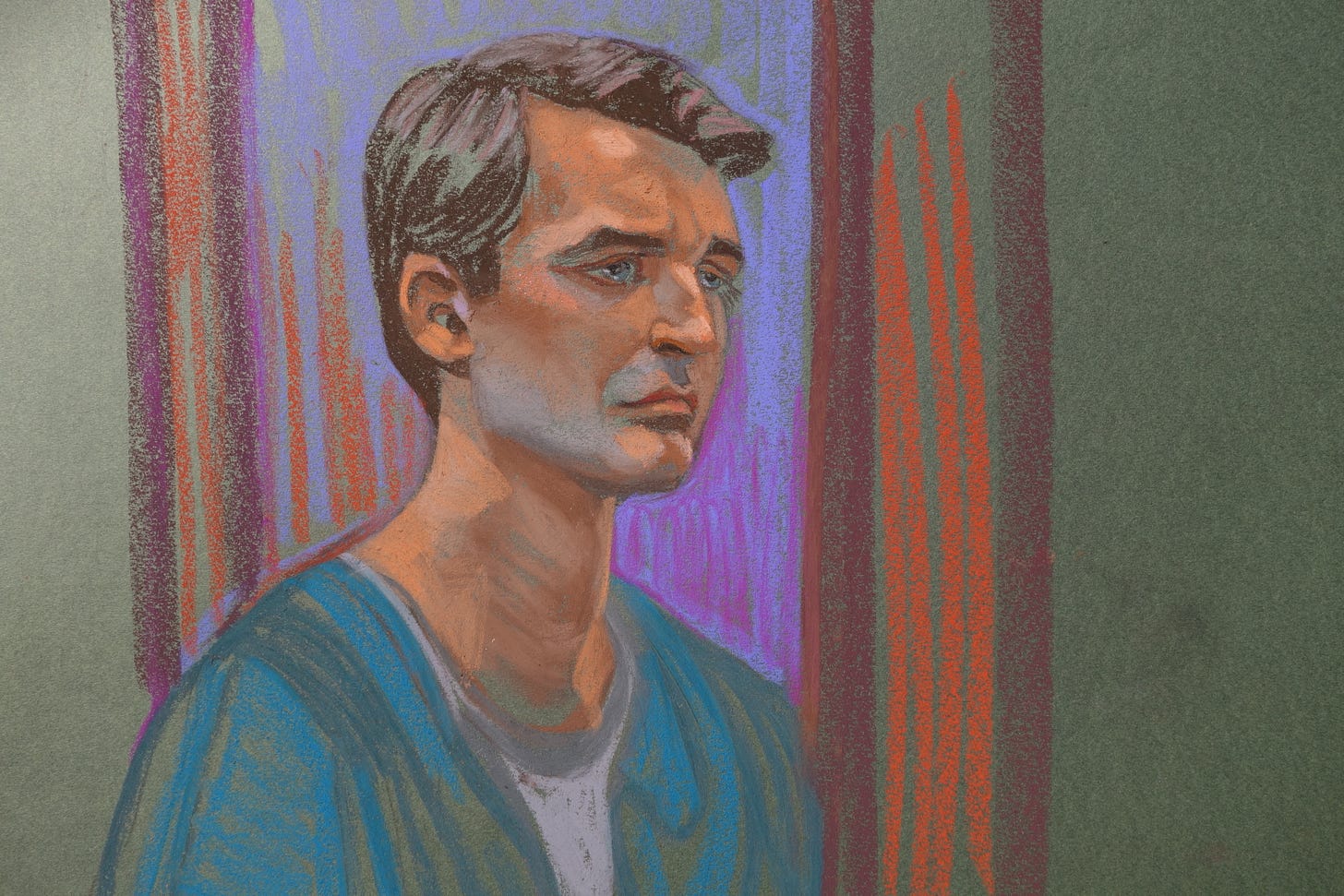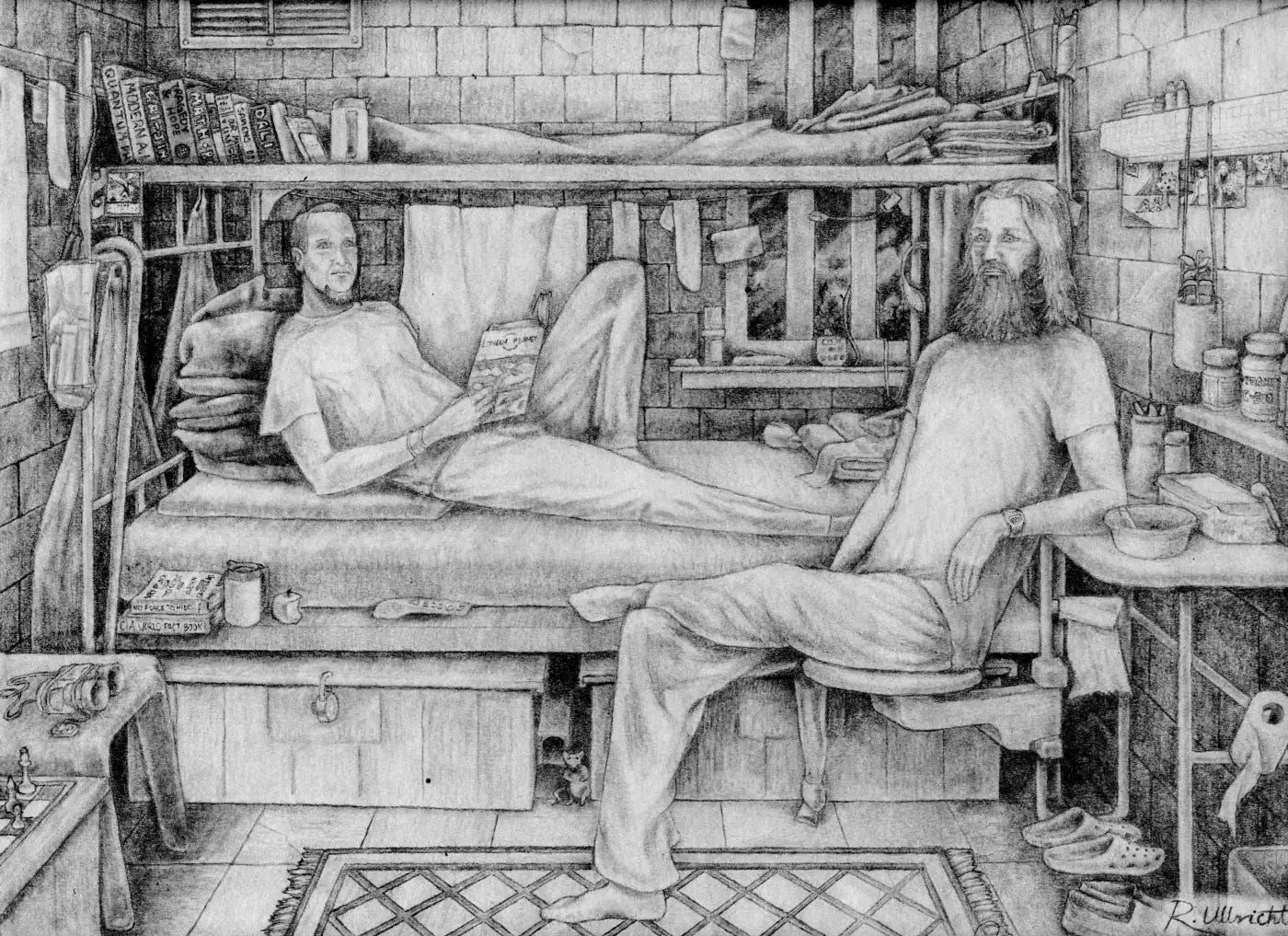Guest post: "Enter Label: Failing upward with inspiration from Ross Ulbricht, Moses, Anne Lamott..." by Rebecca @ Away Messages
"Whatever side of the libertarian, or narco-utopia, discussion you find yourself on—his pain is still relatable." - Rebecca @ Away Messages
Occasionally on “when hope writes” I’ll publish guest posts by brilliant artists and writers. If you want to be a guest blogger on my Substack, please connect with me on Facebook, LinkedIn, or my website.
Today I’m sharing a thought-provoking, daring, and refreshing essay on Ross Ulbricht and pain by an awe-inspiring, personable, and courageous writer and human
of . You can also read it here.Dear Companions,
I was up late one night last week scribbling a letter to imprisoned Ross Ulbricht, founder of the dark net website, Silk Road. The question on my mind: If someone arrives at the “truth” involuntarily, as the product of forced conversion—illness, prison sentence, or Higher Power—is the human she becomes, as pure or on equal level as someone who gets there of their own volition, without the trauma, simply because it was their nature?
In 2015, Ulbricht was found guilty for trafficking narcotics (including stuff like cyanide) and various other criminal conspiracies. I had followed his story back in 2015 after reading a Wired article on a flight. At sentencing, asking the judge for leniency, Ross said this:
Please leave a small light at the end of the tunnel, an excuse to stay healthy, an excuse to dream of better days ahead, and a chance to redeem myself before I meet my maker.
He got the book instead, sentenced to life plus 40 years. He is currently serving in Arizona High Security Prison. I lost track of him over the years, but then recently started following his Twitter, which his mom actually runs as his sentence precludes him from going online. During a torturous evening of symptoms, wherein I found myself writing my letter to Ulbricht, I found that fact particularly cruel. Losing computer privileges permanently is rather a core feature for a programmer who collected 144K bitcoins and processed $80M in commissions on his self-coded website.
Whatever side of the libertarian, or narco-utopia, discussion you find yourself on—his pain is still relatable.

It’s clear this guy is incredibly talented. He was a Boy Scout, and got a full ride to University of Texas at Dallas with a Bachelor in Physics. He then went to Penn State and got a Master in Materials Science and Engineering and studied crystallography. In his personal diary, he outlined his idea for a website “Where people could buy anything anonymously, with no trail whatsoever that could lead back to them.” Two years into his prison sentence, he drew this picture of his cellmate and himself with a grown out beard. The guards called him Crypto Jesus.
After a long rabbit hole down his Twitter and Medium, my letter writing was specifically driven by empathy for his back pain.

There are several posts to that effect. I imagined him suffering in his cell with no medical options or insights into pain neuroscience. I wanted to share information on TMS resources and exercises to turn down the pain volume. He could try somatic tracking, which is a gentle, non-critical and outcome-independent observation of his pain. There are a lot of interesting mindful nuggets to collect in the Healingvrse.
I imagined he was just trying to meditate his problem to death as it appears that is what Ross spends a lot of his time doing. Meditating, ruminating, penning apologies, and seeking clemency (he has collected 500,000 signatures at Change.org). He also runs a meditation workshop for other prisoners. He wrote about his sentence, 9 years in:
But I am not dead. I have died without dying, and by going through this experience, I have been disabused of the illusion that my days are abundant. No, life is short indeed. I see that now. Every day I spend in this cage is a day lost, a day spent in death. I can fast forward in my mind the years and decades ahead of me until the day I breathe my last. I have met men who have been locked up continuously since the 1970s and 80s. That’s me in 2060, still here in the afterlife, in purgatory.
Then, I snap back to the present moment. The present always reasserts itself. No matter how much I resist or ignore it. The present moment is its own kind of death because each moment dies the instant it comes to be. This moment — the one right now as you read this — is both a birth and a death, something brand new that never existed before, and in the same instant, it is gone forever.
He also expresses regret.

But it’s also safe to say he got into Zen once already confined to a cell, probably in a feverish search to expand his soul in inhospitable conditions. It’s still admirable. Many high-profile prisoners in his facility commit suicide, fast. But I guess the question is whether his enlightenment is of a different nature than one who finds truth without all the bloodshed, like, out by a lake observing the hind legs of a cricket, you know, more of the Mary Oliver puritan stuff.
It’s not a 1 to 1 comparison obviously, but my version of a prison term has also forced introversion, and changes of being. For me, the pleasant things in life are now the simple things, like exhaling cold air on a walk under the gray winter sky, pain free. I imagine Ross would love to do nothing more than that.
But I feel like that just makes us different than someone who naturally is even-keeled, introspective, patient, soft. Perhaps it’s why this experience is so cruel, because I’m not the one, never been the one to stay in, to get left behind, to be vulnerable, and more than that, I loved to move wildly, freely, by plane, train or automobile, without a day’s notice, just like Ross, who also moved virtually, ahead of his time.
This forced stillness has required me to dig in internally, and still, I’ve just scratched the surface. These inner demons know well how to put up a fight. I’m disappointed to find them time and again. Bad temper, impatience, wretched fear. I need to find a new gear altogether, and then I wonder: is that going to be authentic?
Somewhere, my Healing Road intersects with the disassembled Silk Road, and at that intersection stands a giant stop sign with the age-old plague of a question: Do the means of our absolution matter?
Consider Moses, one of the most important Prophets, right? He accepts the quest to take the Israelites out of slavery, but despite all the miracles he performs, he doesn’t get to go the promised land. According to some interpretations it is because 40 years into the wandering of the Jews in the desert, Moses struck the rock which had once provided them with water, instead of speaking to the rock, as per his instructions, a sign of his lack of faith and disobedience. As a result Moses could see Israel from a distance, but was forbidden to enter, and instead Joshua would take up the mantle.
Time and again, from the story of Abraham to Moses, it was a part of my study to question the difference between a pure, good soul, and a flawed but magnanimous one, who overcomes major obstacles. For the latter, try as she might, the hero will not necessarily reach the promised land on her journey because of her origin weaknesses.
With this depressed conclusion, I sought advice from Soken, my only friend who is a monk. He gave it a different spin, believing that Buddhist philosophy is a happier application to answer my question.
You can’t arrive at the truth without volition…or even if you do, it doesn’t mean anything, unless you cultivate and deepen and protect your insight through training and practice. People arrive at the truth every day, but they kill it or give it up as soon as they arrive at it…until eventually they lose their ability to sense it anymore and the truth abandons them.
Perhaps he is right, perhaps the question is a bad one to begin with. Truth is not something to behold. It must be practiced. Without practice, there is no truth. The truth is vulnerable, but also always accessible.
Studying the craft of writing, we find a similar lens with which to view the question. Anne Lamott, in her book Bird By Bird, Some Instructions on Writing and Life, believes that the only way to approach writing is through revision, and the clear-eyed, unshakeable understanding that the first draft will be terrible. In fact, she goes further:
All good writers write shitty first drafts. This is how they end up with good second drafts and terrific third drafts…I know some great writers, writers you love who write beautifully and have made a great deal of money and not one of them sits down routinely feeling wildly enthusiastic and confident. Not one of them writes elegant first drafts. We all often feel like we are pulling teeth even those writers whose prose ends up being the most natural or fluid. The right words and sentences just do not come pouring out like ticker tape most of the time. For most of the other writers I know, writing is not rapturous. In fact the only way I get anything written at all is to write really, really, really shitty first drafts.
I guess I’ll end with the idea that perhaps it’s all right we revise ourselves until we get it right. Maybe that’s the better framework with which to view change. Some of us get where we get by failing upward. We are served better by focusing less on the moot point of our nature, and more on the tangible questions at hand, and the road ahead.
Much love from the Healingvrse,
Rebecca
I’m in awe of Rebecca’s openness, vulnerability, bravery, and fortitude in writing on difficult, uncomfortable, and private matters such as chronic pain. Each essay on Away Messages is unique, stimulating, and pensive. Below are other essays I highly recommend you read.
Please leave a comment of appreciation for Rebecca’s tremendous work and share the post widely with others.
Thank you!










There’s so much to think about here. Thank you for sharing.
So much food for thought, here. Thank you.
The question, ‘Do the means of our absolution matter?’ has stayed with me. I was recently reminded of something I once read (in a book called Breathing Under Water, that’s actually about the Twelve Steps), and then again in regards to that question:
The preferred ego pattern is:
sin --> punishment --> repentance --> transformation
The grace pattern is:
sin --> unconditional love --> transformation --> repentance
I’m still trying to make the grace pattern my go-to, towards myself & everyone else. I manage it, sometimes. And on the occasions that I do it certainly feels better than the alternative. It’s a journey… Thank you, both, again, for offering so much to muse on!